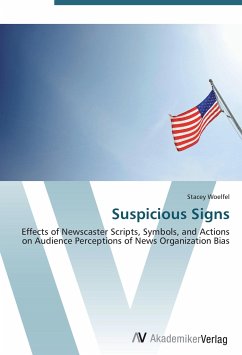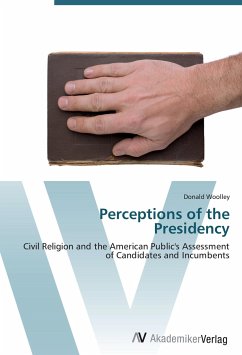
Suspicious Signs
Effects of Newscaster Scripts, Symbols, and Actions on Audience Perceptions of News Organization Bias
Versandkostenfrei!
Versandfertig in 1-2 Wochen
52,99 €
inkl. MwSt.

PAYBACK Punkte
26 °P sammeln!
Revision with unchanged content. In the wake of September 11, a wave of patriotism swept across the country. Flags and patriotic paraphernalia popped up almost everywhere including on the lapels of television news anchor people. The display of symbols raised the question of whether such displays projected a possible image of bias to television viewers. This research examines the perceptions of television news viewers exposed to varying levels of bias in visual cues and verbal information. Subjects viewed short television news breaks that were altered to add bias. Independent variables included...
Revision with unchanged content. In the wake of September 11, a wave of patriotism swept across the country. Flags and patriotic paraphernalia popped up almost everywhere including on the lapels of television news anchor people. The display of symbols raised the question of whether such displays projected a possible image of bias to television viewers. This research examines the perceptions of television news viewers exposed to varying levels of bias in visual cues and verbal information. Subjects viewed short television news breaks that were altered to add bias. Independent variables included lapel pins supporting a particular cause, biasing language in support of the cause, and newscaster participation in a rally for the particular cause. Dependent variables measured perceptions of fairness, accuracy, and balance. Results of the research suggest television news viewers develop a form of inertia in their perceptions of newscasters and news organization that is not easily moved by single instances of bias no matter how severe. Subjects did not change perceptions of bias in most cases, only registering a change in some instances of the most severe forms of bias. The research suggests news organizations need not be perfect in their pursuit of unbiased news presentations, but may experience declines in audience respect with repeated bias.












